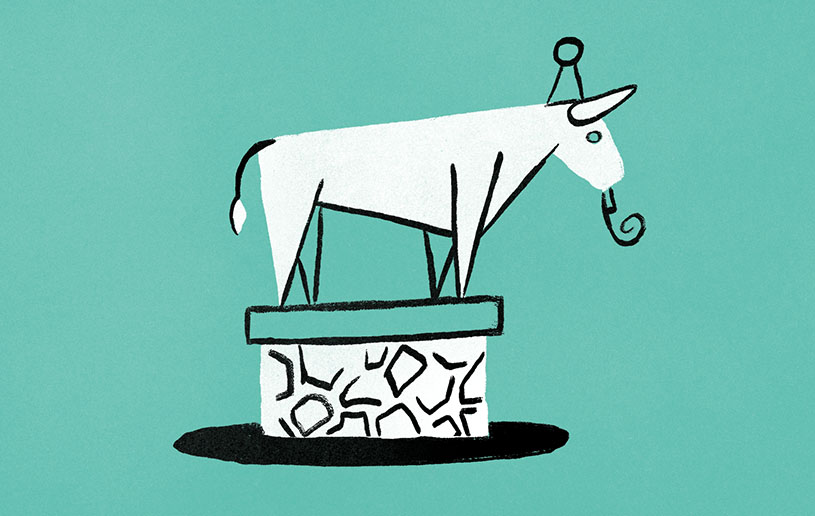
Hedonism is another logical outcome of secularism. The hedonist sees himself as alone in the universe. He’s discarded the Christian concept of the infinite, personal God, who made the world and rules it by His providence. And because there’s no God, and since this life is all there is, the hedonist reasons “Let’s party! If my life has no eternal significance then why not enjoy whatever pleasure I can in my brief time here? I’m here for a good time, not a long time. “’Eat, drink, and be merry, for tomorrow we die.’”
We all experience pain and we don’t like it. We all experience pleasure and we do like it. What hedonism does is transform pleasure into a philosophy of ultimates. It’s the belief that man’s ultimate purpose is found in pursuing ultimate pleasure, avoiding pain, and seeking happiness through food, drink, drugs, sex, sport, or whatever.
This outlook, with its own set of values and judgements, in turn produces its own morality. “If it feels good, it is good” and “It can’t be wrong, when it feels so right.” Pleasure becomes the ultimate criterion of value so that truth and goodness are determined by what produces pleasure and avoids pain.
There is nothing wrong with pleasure. But when these interests dominate one’s life instead of God, they become sinful idols. For that reason, Scripture condemns hedonism.
Solomon tested all kinds of pleasures but they were all meaningless (Ecclesiastes 2:1–11). Amos condemned the love of pleasure because of the callous selfishness so often associated with this attitude (Amos 6:1–7). Peter wrote to Christians who had past hedonistic lives (1 Peter 4:3–4) and Paul calls Christians not to live hedonistically. “Because we belong to the day, we must live decent lives for all to see. Don’t participate in the darkness of wild parties and drunkenness, or in sexual promiscuity and immoral living, or in quarreling and jealousy” (Romans 13:13).
Christianity does not call us to seek suffering, pursue pain, or flee from that which is pleasant. There is no sin in being free from pain and enjoying the pleasant. But there are times when as Christians we must choose the road that results in pain. “...we must suffer many hardships to enter the Kingdom of God” (Acts 14:22). That is why we do not consider hedonism as the highest good.
How should we as followers of Jesus respond to the culture and allure of hedonism?
1. Remember what God says about hedonism
“Those who live only to satisfy their own sinful nature will harvest decay and death from that sinful nature. But those who live to please the Spirit will harvest everlasting life from the Spirit.” (Galatians 6:8)
2. Renounce hedonism
Many Christians would deny being hedonists, but their actions and lifestyles show otherwise. Scripture says, “Wherever your treasure is, there the desires of your heart will also be” (Matthew 6:21). A good test of what we ultimately value and are pursuing in life is to look at what we are spending our time and money on. Let the Holy Spirit search our hearts and disclose to us what our pursuits really are.
3. Repent of hedonism
Only after we have recognized our own sin in this and repented of it can we credibly speak to others about it and share Christ. Knowing Him is infinitely more satisfying than the quest for pleasure. Repenting means changing direction. So instead of delighting in pleasure-seeking, “Take delight in the Lord, and he will give you your heart’s desires” (Psalm 37:4).
4. Reveal hedonism for what it is
Show that hedonism is a dead end and destructive to the individual committed to it. One problem with hedonism is the hedonistic paradox—the problem of excess. If, as hedonists, we fail to achieve the measure of pleasure we seek, we experience frustration. Frustration is painful. The more that happens the more pain is experienced. On the other hand, if we achieve all the pleasure we seek, we become sated and bored. Boredom is the counterpart to frustration. This too is painful to the hedonist. So the paradox is this: If we achieve what we want, we lose; if we don’t achieve what we are searching for, we lose. The result of hedonism is the opposite of its goal. Its only fruit is ultimate pain.
Hedonism is a philosophy of despair. It reflects a deep-seated sense of hopelessness and longing. The hedonist is seeking fulfilment and looks for it in pleasure and avoiding pain.
We were created for God and just as fish are in despair out of water so the human soul is in despair when it is outside of fellowship with God. He is the source of true fulfilment and our greatest pleasure in life is to glorify and enjoy Him forever

